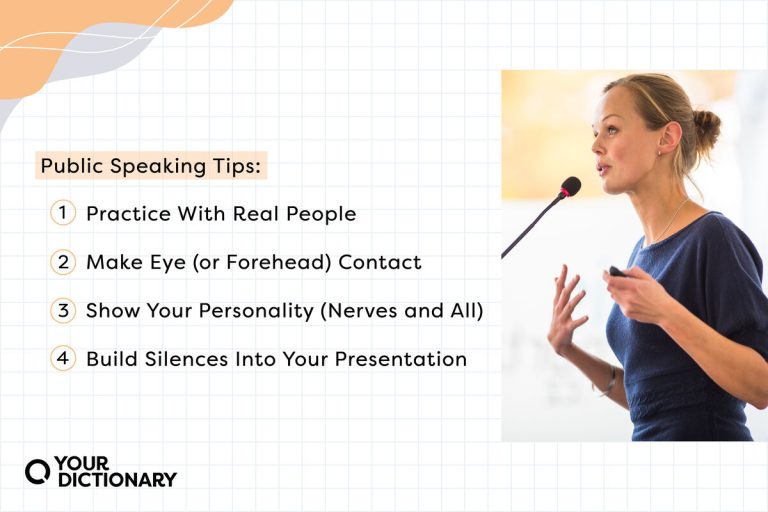What is the Biggest Enemy of Public Speaking?
The biggest enemy of public speaking is fear and anxiety. Fear and anxiety can inhibit a person’s ability to communicate effectively in front of an audience, leading to a lack of confidence and clarity in their message.
Public speaking requires individuals to overcome their fear and anxiety in order to deliver a successful presentation. The ability to connect with an audience and convey ideas is essential in many professional and personal situations. Developing strategies to manage and overcome the fear of public speaking is crucial for personal growth and professional success.
By understanding and addressing the root causes of fear and anxiety, individuals can become more confident and skilled public speakers. With practice and preparation, anyone can overcome their fear of public speaking and become a powerful communicator.
Understanding The Role Of Fear In Public Speaking
Fear is often considered the biggest enemy of public speaking. It plays a crucial role in this art. Fear becomes a common obstacle that many individuals face when they have to speak in front of others. The psychology behind fear in public speaking is intriguing.
It directly affects performance, leading to nervousness, anxiety, and stage fright. However, fear can be overcome through awareness and preparation. Being aware of the fear can help individuals identify its sources and find ways to manage it effectively. Additionally, thorough preparation, including researching and practicing the speech, can boost confidence and reduce fear.
By recognizing the role fear plays in public speaking and taking proactive steps, individuals can conquer their fear and become impactful speakers.
The Impact Of Self-Doubt On Public Speaking
Self-doubt can be the biggest enemy of public speaking, impacting individuals in various ways. It creates a vicious cycle, making the fear of speaking in public more intense. Recognizing self-doubt as a barrier is crucial for overcoming it. Understanding the negative thoughts and emotions associated with self-doubt is the first step towards building self-confidence.
Strategies such as positive self-talk, visualization, and practice can help boost confidence when speaking in front of an audience. By acknowledging and addressing self-doubt head-on, individuals can break free from its grip and become more proficient and effective public speakers.
Embracing self-confidence allows individuals to engage with their audience in a more meaningful and impactful way, leaving a lasting impression. Overcoming self-doubt is essential for personal growth and professional success in public speaking.
The Power Of Negative Self-Talk
Negative self-talk can be a significant hindrance to mastering the art of public speaking. To overcome this challenge, it is crucial to identify patterns of negative thoughts that arise during preparation or performing in front of an audience. By recognizing these patterns, one can effectively challenge and reframe them into more positive and empowering beliefs.
Additionally, incorporating positive affirmations into one’s daily routine can play a crucial role in boosting confidence and self-esteem when speaking publicly. By cultivating a positive mindset and replacing self-doubt with encouraging statements, individuals can gradually overcome the biggest enemy of public speaking – negative self-talk.
With practice and determination, anyone can develop the essential skills to confidently address an audience, leaving behind the fear and self-limiting beliefs that hinder their success.
External Factors That Hinder Public Speaking
Public speaking can be hindered by various external factors. One major obstacle is the lack of preparation and practice. Another challenge stems from unsupportive audience reactions. Technical difficulties and equipment failures can also impede a speaker’s performance. It is crucial for speakers to invest time in practicing and studying their material.
They should anticipate various audience responses and prepare accordingly. Additionally, speakers must have contingency plans for technical issues that may occur during their presentations. By addressing these external factors, individuals can overcome the biggest enemy of public speaking and deliver impactful presentations.
The Role Of Experience In Overcoming Public Speaking Challenges
Experience plays a crucial role in overcoming the biggest enemy of public speaking. Gradual exposure helps build confidence and familiarity, enabling speakers to conquer challenges. By learning from past mistakes and successes, individuals can refine their skills and improve their performance.
It is important to maximize opportunities for growth and improvement, enhancing public speaking abilities over time. Through consistent practice and exposure, speakers become more comfortable and effective in delivering their message. The key is to embrace each opportunity as a chance to gain experience, recognizing that every speaking engagement contributes to personal growth.
With each successful speaking experience, confidence and proficiency increase, ultimately leading to the mastery of public speaking skills. Overcoming the fear and challenges associated with public speaking is a gradual process that relies heavily on personal experience and continuous improvement.
Techniques For Overcoming The Biggest Enemy Of Public Speaking
The biggest enemy of public speaking is fear. Techniques like visualization and mental rehearsal can be helpful. These techniques involve imagining oneself successfully delivering a speech and receiving positive feedback. Breathing exercises are another effective tool for managing anxiety. By taking slow, deep breaths, one can calm their nerves and feel more centered before speaking.
Seeking support from mentors or joining public speaking groups is also beneficial. Mentors provide guidance and feedback, while groups offer a safe environment for practice and constructive criticism. Overcoming the fear of public speaking takes time and effort, but with these techniques, it is possible to become a confident and effective speaker.
Developing A Growth Mindset To Combat Public Speaking Challenges
Developing a growth mindset is crucial in combatting the greatest enemy of public speaking. Instead of shying away from failures, embrace them as valuable learning opportunities. Cultivate a mindset of continuous improvement, believing that every setback is a chance to grow.
Setting realistic goals gives you something tangible to work towards, while celebrating progress along the way keeps you motivated. With a growth mindset, you approach public speaking challenges with resilience and determination. By constantly challenging yourself and learning from both successes and failures, you can overcome the fear and anxiety associated with public speaking.
Embrace the power of a growth mindset to unlock your full potential as a confident and effective public speaker.

Credit: www.lowyinstitute.org
Frequently Asked Questions Of What Is The Biggest Enemy Of Public Speaking?
What Is The Dislike Of Public Speaking?
Public speaking is disliked due to various reasons. First, people may fear being judged or criticized by others. Second, the fear of forgetting information or stumbling on words can cause anxiety. Third, some individuals might struggle with stage fright, experiencing physical symptoms like sweating or trembling.
Fourth, the pressure of being the center of attention can be overwhelming for many. Fifth, the lack of confidence in their speaking abilities may hinder their desire to address an audience. Lastly, past negative experiences or traumatic events related to public speaking can lead to a general aversion towards it.
It is crucial to acknowledge these concerns and work on building confidence and skills to overcome the dislike of public speaking.
What Is The Greatest Fear In Public Speaking?
The greatest fear in public speaking is stage fright. It stems from the fear of being judged by others. People often worry about making mistakes or forgetting their lines. This fear can cause anxiety and nervousness, leading to physical symptoms like sweating, trembling, or a racing heart.
Overcoming this fear requires practice, preparation, and building self-confidence. Remembering that everyone makes mistakes and that the audience wants you to succeed can help alleviate some of the anxiety. Breathing exercises and positive self-talk can also be helpful in managing stage fright.
With time and experience, public speaking can become more comfortable, allowing individuals to effectively convey their message to the audience.
Why Do Most People Hate Public Speaking?
Most people hate public speaking due to several factors such as fear, anxiety, and self-consciousness. The fear of being judged and making mistakes often overwhelms individuals, causing them to avoid public speaking situations. The pressure of being in the spotlight, having all eyes on them, and the potential for embarrassment can be incredibly intimidating.
Anxiety about forgetting what to say or stumbling over words adds to the dislike of public speaking. Additionally, feeling self-conscious about one’s appearance, voice, or body language can further contribute to the aversion. It is important to note that not everyone dislikes public speaking, as some individuals may enjoy the opportunity to share their knowledge or network with others.
What Is The 2Nd Fear In Public Speaking?
The second fear in public speaking is the fear of being judged by the audience. Many people worry about what others will think of their performance or speaking abilities. This fear stems from a desire to be accepted and respected by the listeners.
To overcome this fear, it is important to remember that everyone has their own insecurities and that the audience is typically supportive and understanding. Building confidence through preparation and practice can help alleviate this fear. Embracing the idea that making mistakes is a part of the learning process can also reduce anxiety.
Ultimately, focusing on delivering valuable and engaging content will allow the speaker to connect with the audience and diminish concerns about judgment.
Conclusion
Public speaking can be a daunting task, and it’s important to identify and overcome its biggest enemy. Fear, self-doubt, and lack of preparation are some common obstacles to effective public speaking. However, one of the greatest enemies of public speaking is the fear of judgment and criticism from others.
This fear can hinder individuals from expressing their thoughts and ideas confidently, leading to missed opportunities for personal and professional growth. Overcoming this fear requires self-belief, practice, and adopting a positive mindset. A supportive environment that allows for constructive feedback can also play a crucial role in building confidence.
By acknowledging and addressing the fear of judgment, individuals can develop their public speaking skills and become more persuasive and effective communicators. So, remember to embrace the challenge, believe in yourself, and step out of your comfort zone to conquer the biggest enemy of public speaking.
With practice and determination, you can become a confident and influential speaker.






